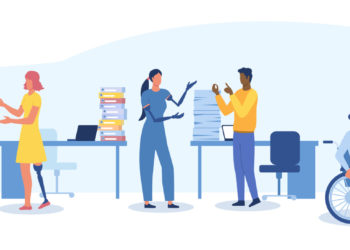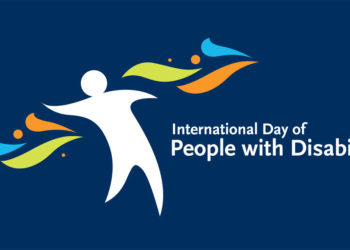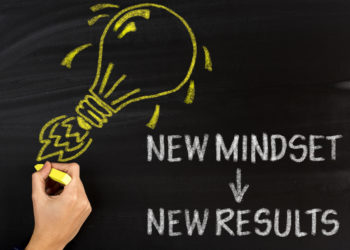Editor’s note: Today’s guest post is a conversation between Sylvia Hunter (Inera | An Atypon Company) and Katy Alexander (Digital Science), about job hunting with a disability in the publishing industry. It follows on from this post by Simon Holt (Elsevier) who is severely sight-impaired, and Erin Osborne-Martin (Wiley), who has a spinal cord injury, who focused on how disability affects applying for and interviewing for new roles.
Katy: Contemplating applying for a new job is terrifying for me. You’d think that, in my mid-40s, with the many career changes I’ve had, I would have reached a stage where applying for a new job isn’t scary — but it is. I’m neurodiverse, and after a lifetime of being told I’m just not smart enough or good enough, it seems as though no matter how much progress I make in my career, that feeling will always be with me. This doesn’t mean I don’t like new opportunities or relish a challenge, but searching and applying for new roles is a brutal task to undertake, so I approach any job application with great precision and care.
Sylvia: What Katy said! I have anxiety and mild depression, and I find that deciding whether to apply for a particular job can be a stressful guessing game, because so much of the language used in postings is ambiguous. If only we could get everyone to agree to definitions for terms like “fast-paced,” “deadline-driven,” and “flexible hours”! (How about a job posting DTD?)
Katy: Did you know that 52% of people with dyslexia have experienced discrimination during interview or selection processes? Given that 10% of the population has dyslexia, that’s a lot of job seekers. Some organizations may be actively trying to discourage disabled applicants by using specific terminology, but most employers aren’t excluding us intentionally — they just don’t realize they’re doing it. More importantly, I don’t think they realize that some of the language they use would put off most discerning job seekers, disabled or not.

Sylvia: To illustrate how job postings can affect our job-search process, we’re going to walk through some of the commonly-used words and phrases in scholarly communications job descriptions.
Katy: Let’s start with the company description. Our industry is small, and you learn quickly which organizations live up to their values. When what I read doesn’t line up with what I’ve heard or experienced in the market, it becomes little more than pixels on my screen. This is especially true for job seekers with protected characteristics: we’ll do as much background research as possible and are very cautious when applying to new roles or companies where the culture isn’t seen to be supportive.
Sylvia: What does it mean when a company says it’s mission-driven? Does it mean I’ll be surrounded by enthusiasm for the organization’s valuable work? Does it just mean people work very long hours for not-great salaries? (I hear you saying “those aren’t mutually exclusive,” and okay, you’re right.) Instead, what if you demonstrated your commitment to equity and transparency by including a salary range, work-from-home policies, and approximate working hours in every posting?
Katy: I like knowing who the hiring manager is, because then I can find them on LinkedIn, see if I know someone who’s worked with them, and try to find out how open and inclusive they are to disabilities and different ways of working. Even when the company’s policies seem great, a manager can make or break my experience at work.
Sylvia: Completely true! I’ve also self-selected out of applying to jobs because of what the company’s website or the job posting suggested about various elements of “culture fit”. This isn’t necessarily a “disability thing,” but it’s certainly crucial to know if, for instance, an organization really values on-the-spot presentations or discourages remote work!
Katy: Here comes the meat of the posting now: job description and experience required. No matter how many bullet points and sub-bullets there are, I will read Every. Single. One. — checking off the things I can do and those I think I will struggle with. And here’s a roadblock: “Ability to think on your feet.” My initial reaction: “I can’t do this!” I’m neurodiverse, my brain just works differently, and I need time to process my thoughts. But that doesn’t mean what I offer is any less valuable! It’s just different. People think in different ways and at different speeds. And who has all the answers right away? No one — disabled or not. Instead of telling me how I should think, tell me what you want the person doing this role to achieve.
Sylvia: Some similar catch-phrases that suggest a job might not be for me are fast-paced environment, deadline-driven, and works well under pressure. Maybe that means I won’t be bored! Maybe it means that the occasional crisis is inevitable. But maybe it means that on this team or in this role, crisis mode is standard operating procedure, and I’ll be in a constant state of borderline panic. What if instead the posting said, for example, “our journal workflow involves strict deadlines, but we design our schedules to minimize last-minute crises”?
Katy: We all expect a certain level of pressure, and there will always be busy times, when it’s all-hands-on-deck to make things happen. But if working under pressure is so vital to a role that it has to be in the job advert, what does that say about how you resource your teams, prioritize your goals and workloads? For people with or without a disability, these throwaway phrases send a message about what it’s like to work for you.
Sylvia: I also feel pretty cautious when I see takes initiative and self-starter in a job posting. Sometimes it translates to a great workplace where my expertise is respected and I’m not micromanaged! But sometimes it’s code for “you’ll burn out in a week because there’s no training and the culture strongly discourages asking for help or feedback when you need it.” If what you mean is “we want to hear your ideas, we want you to ask as many questions as you need to, and we don’t want your workload to crush you,” why not say so? And don’t get me started on juggling multiple projects — does that mean handling half a dozen journals with different requirements, or does it mean “two people quit and we’re hiring someone to do both their jobs, so good luck”?
Katy: I was feeling great about this, but here’s another obstacle: “Exceptional writing and communication skills”? I’ll probably come back to this one again and again. I’m dyslexic, so I’ll never be an exceptional writer. The delay between the processing of my thoughts and my verbal communication makes me constantly worry about being a clear communicator, so I’ve learned to over-communicate. Let’s stop and think about this one — does your job really need an exceptional writer, or do you need someone who can clearly communicate and convey information in many different ways to ensure that it’s understood? It’s likely that what you’re looking for is “effective communication skills,” and I have those.
Sylvia: Here are two that give me pause: this job requires tact and diplomacy or a good sense of humor. Am I applying to the Ministry of Foreign Affairs? In our industry, this could mean anything from “you’ll be using your author-querying skills a lot” and “some of our clients are mildly eccentric” to “you’ll have to deal with horrible people who yell at you.” Be more specific! I’m much more likely to apply if the posting says “we work with a wide range of authors, and some of them have strong opinions! If you need to enforce a boundary, your manager will back you up.”
Katy: Here’s a gem I found on a Brand Ambassador job advert recently: “Ability to work long hours on your feet.” Where to start with this one? The use of “feet” reeks of ableism, and the “long hours” — both as someone who struggles with cognitive exhaustion and as a parent, makes me pretty sure this work environment is not for me. I go into work to do my best, to give my most; working extra time happens, and I don’t mind it, but this sentence signals a culture problem in the organization. If you work long hours, it’s best to be up front about it — but working long hours isn’t how a company becomes successful or sustainable. Employee burnout is an increasingly worrying health trend, and it’s costing businesses money. And younger job seekers are entering the market with different expectations of what their work-life balance should be, so this approach to work is going to have to change.
Sylvia: Managing work stress is important for everyone, irrespective of any mental health diagnosis they may or may not have. As Katy says, we need to do a much better job of fostering a work-life balance that’s not so heavy on the work. Successfully walking the work-life balance tightrope looks different for everyone! After 25 years in the workforce, I know what it takes for me to stay in a good place, mental-health-wise, and I know that’s where I need to be in order to do my job well. I also know that whatever job I’m doing, I’ll be miserable if I don’t think I’m doing it well.
And here’s the thing: I’m good at my job. I’ve been good at many of my previous jobs, too. But the first two-thirds of my career took a toll on my personal life because of what I didn’t yet know about myself, my mental health, and the conditions under which I can do my best work. I’ve learned a lot about how to take care of myself, advocate for what I need, and say no to things that will topple my own Jenga tower. I’ll always have my anxiety crocodile, but our relationship has changed a lot.
Knowing this thing about myself has made me a better, more creative, more reliable employee as well as a happier person! At the same time, it creates a new worry: Do I tell people? When do I tell them? How do I tell them? Or do I just ask for the things I need, without explaining why?
I don’t have answers to these questions, because both questions and answers are so context-specific and so fraught. I tend to err on the side of disclosure, and I think it’s because now that I have an explanation for the thought patterns and behaviors that have plagued me since I was a little kid, some part of me wants people to know. I don’t know if I could have been this frank in my 20s or even my 30s — and people shouldn’t have to be.
Katy: If you hire people as part of your job, here’s what we’d like you to take away from this post:
Imagine you’re a job seeker with a disability — and you keep seeing requirements that exclude you, again and again, in every job you’re interested in applying to. It’s exhausting and frustrating. You can help change that! The next time you’re writing or reviewing a job description, think about what it’s accidentally telling someone like Sylvia or me, or many others.
Nothing we’ve highlighted above is necessary in a job description — regardless of disability. Inclusion is about everyone: making a workplace open, inviting, and supporting to all employees. By considering your disabled applicants in your company culture, you are creating an environment that is more open and welcoming to all.
A job description signals what an organization’s culture is like and how they think about things. If you aren’t making your workplace environment more inclusive and supportive for everyone, you’ll find your pool of talent shrinking.
Discussion
1 Thought on "Job Hunting with an “Invisible” Disability: A Conversation"
Thank you for such a frank discussion! It keeps chipping away at stigmas. What you describe is me. And so many others. Every hiring manager and HR director should read your insightful tips.


